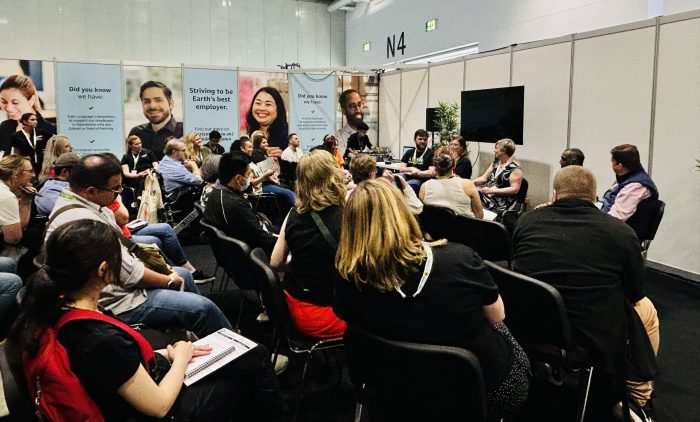Ability groups vs. needs
Addressing the accessibility barriers for every impairment and disability can seem an overwhelming task...
Addressing the accessibility barriers for every impairment and disability can seem an overwhelming task...
The Disability Expo 2023 held at London’s ExCeL Centre on the 7th and 8th of July was an extraordinary two-day event that celebrated diversity, advocated for disability rights, and showcased the latest advancements in assistive technology, products, and services in the disability space. Among the various themes that emerged during the Expo, one resounding message was the importance of advocacy in promoting inclusivity and understanding for people with disabilities.
Some highlights included:

Not to mention, the variety of products and services displayed at the exhibit and the people behind them who were excitable and committed to a more accessible world.
Read on to find out what had the biggest impact on me during the event.
The panel discussion on International Travel really stood out to me because this conversation had a rich mix of perspectives and illustrated what a minefield travelling can be with a disability, visible or hidden. Several representatives from the aviation industry participated in panel discussions, addressing the challenges and progress in making air travel more accessible.
Initiatives such as the Rights on Flights campaign have been working hard to improve accessibility for all air travellers through education and advocacy. However, the inaccessibility of airplane toilets remains a significant challenge for many disabled passengers, as well as the care and training of airport staff to better support people of varying abilities. The Civil Aviation Authority (CAA) has been actively auditing airports to identify areas for improvement and ensure that they meet accessibility standards.
Different naming conventions such as the negative connotations of the term “handicapped” and the use of the term “people of determination” in the UAE were also discussed, highlighting the importance of using respectful and consistent language across countries which is of course important for people travelling internationally. Interestingly, I learned that the introduction of hidden disability lanyards was initiated in Gatwick Airport within the aviation industry. This initiative by the Sunflower has been a game-changer in facilitating a more inclusive flying experience and has had such success that people now use them in other public spaces improving the lives of people with non-visible disabilities.
Another panel that was very insightful was Access for Equal Employment Opportunities hosted by the founder of the Inclusivi-T podcast, Jamie Shields. The significance of representation was highlighted, and it was emphasised by all that representation is not just about numbers but about opportunity and empowerment.
On the one hand, the COVID-19 pandemic brought about some positive changes, with more opportunities for remote work that have accelerated careers for people with disabilities who were previously excluded because of inaccessible offices or because they had difficulties travelling to an office. Nevertheless, concerns were raised about the potential segregation of disabled employees if a hybrid work model becomes prevalent, with able-bodied individuals back in the office while disabled workers may be expected to work from home permanently.
Ultimately, discussions kept coming back to one salient point; although hiring is on the up and there are more opportunities and accommodations available, there is a serious need for greater representation of disabled individuals in leadership positions in the workforce. Business cases that demand proof of why people with disabilities should be employed are irrelevant and unnecessary, and quite frankly painful; inclusion should be a fundamental aspect of a diverse and equitable workplace. Not only is representation powerful in giving individuals hope and confidence in pursuing their goals, but it is also essential for businesses to understand their customers fully. Disability-inclusive workplaces have clearly demonstrated better financial results, innovation, and productivity, as they can cater more effectively to the diverse needs of their customer base. The Purple Pound, representing the spending power of disabled individuals, further emphasises the importance of catering to this significant demographic.
A fantastic stand I came across at the Expo was Snowball, a mobile app where users can rate and review places for their accessibility, much like you would do on TripAdvisor or Google Reviews but led straight from the disability community. I really enjoyed talking to Simon Samson, the founder of Snowball, who got me onto the app immediately and ran me through it. I would strongly recommend checking it out and adding some reviews to places you visit to not only help the community, but also to inform organisations of ways they can improve their accessibility for everyone.
I was also lucky to chat to the kind people at the Aventido stand who showed me a host of digital tools for people using assistive technologies. I was happy to see some newer products available to help people in the education or work environment such as:
Overall, The Disability Expo 2023 was an enlightening and empowering event that showcased the importance of advocacy, representation, and inclusivity. The collective efforts of individuals, businesses, and organisations showcased the tremendous potential to build a society that does not disable anyone, where everyone can thrive. The powerful narratives heard from the people participating in the panels was so informative and emphasised the collective efforts being made across industries. The strong sense of community was truly felt, and I’d highly recommend their future events. I know I’ll be back!

Addressing the accessibility barriers for every impairment and disability can seem an overwhelming task...
Addressing the accessibility barriers for every impairment and disability can seem an overwhelming task...
Disabled Access Day is a national annual initiative to raise awareness of the importance of inclusive access and encourage conversations between ...
Disabled Access Day is a national annual initiative to raise awareness of the importance of inclusive access and encourage conversations between disabled people, businesses and venues...
We hope that our infographic helps to increase your knowledge about disability in the UK...
We hope that our infographic helps to increase your knowledge about disability in the UK...